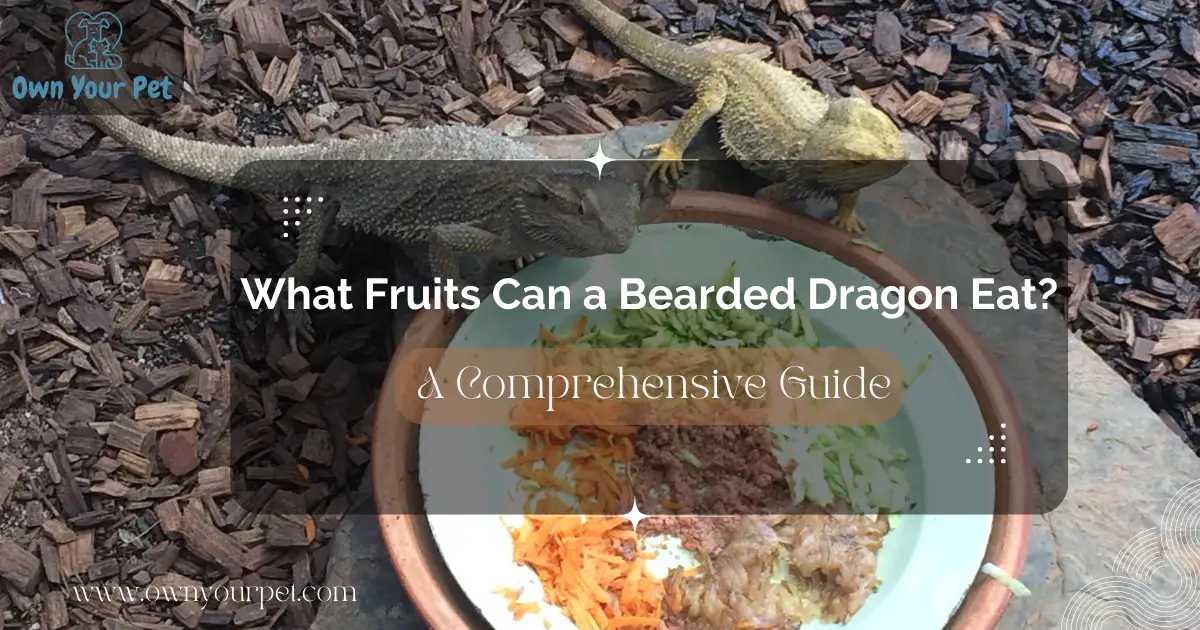When it comes to the diet of a bearded dragon, incorporating a wide variety of fruits can be a popular nutritious choice. But the question is, what fruits can a bearded dragon eat? While leafy greens like collard greens and dandelion greens are staple foods, fruits like sweet potatoes can provide essential nutrients.
Offering them in bite-sized pieces promotes calcium absorption. However, it’s important to remember that fruits should be offered in moderation as part of a balanced and healthy diet. For baby dragons, extra care should be taken, and wax worms can be considered an occasional treat.
What Fruits Can a Bearded Dragon Eat? Everything You Need to Know
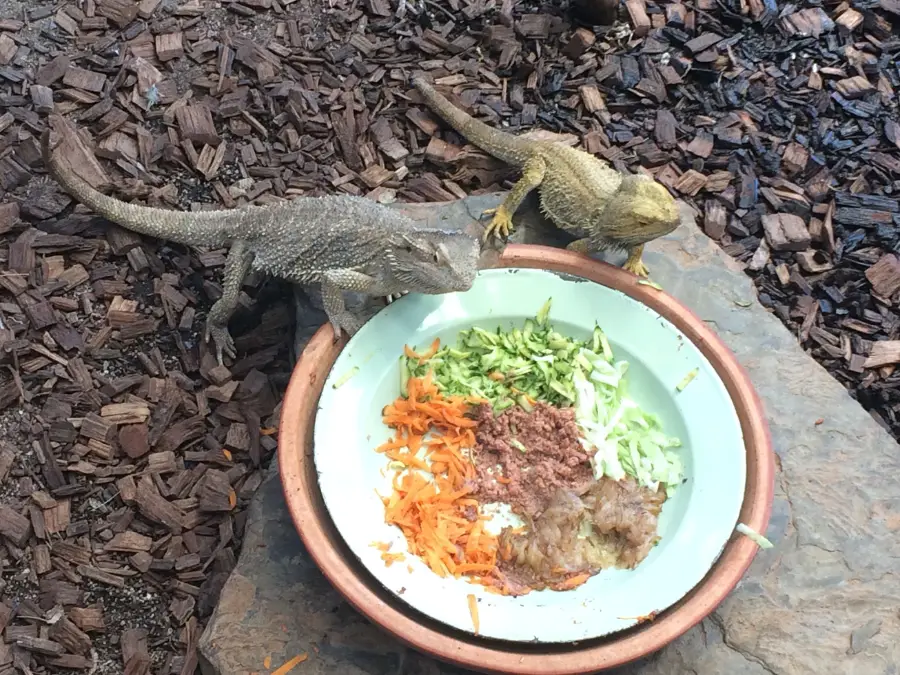
Bearded dragons are popular reptiles kept as pets, known for their distinctive appearance and friendly nature. A crucial aspect of keeping these fascinating creatures healthy is providing them with a balanced diet that meets their nutritional needs.
One way to achieve this is by incorporating a variety of fruits in their diet, which can offer essential vitamins, minerals, and natural sugars as a treat or supplement to their main food sources.
Young bearded dragons primarily require a protein-rich diet consisting of insects, while adult bearded dragons need a more balanced diet with a higher percentage of fruits, vegetables, and greens.
The fruits you choose to offer your bearded dragon should be carefully selected, as some are safe and nutritious while others can be harmful due to their high acidity or sugar content.
This article will discuss the best and safest fruits for your bearded dragon, addressing their nutritional benefits and the proper ways to serve them. From antioxidant-rich choices like strawberries and blackberries to the controversial options that may pose a risk, our guide aims to help you make informed decisions about your bearded dragon’s diet.
Fruits and Bearded Dragons’ Diet
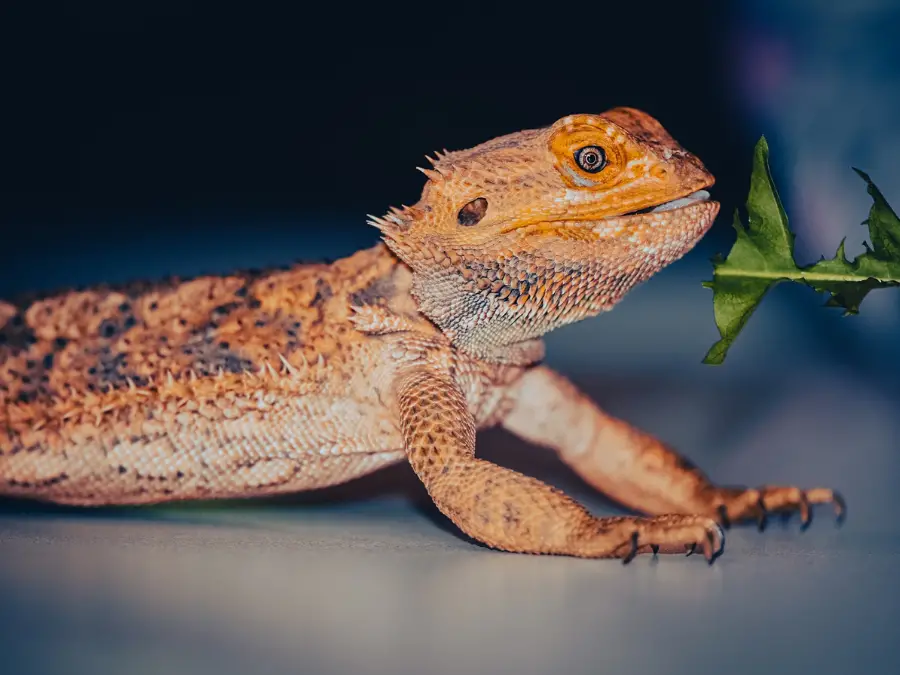
Bearded dragons are omnivores, meaning their diet consists of animal protein and plant-based foods. It is essential to maintain a proper ratio of fruits, vegetables, greens, and insects in their diet to ensure their health and well-being.
Fruits to Include
Fruits serve as a great source of vitamins, fiber, and hydration for bearded dragons. However, they should only be fed as occasional treats due to their high sugar content. Some of the best fruits to include in a bearded dragon’s diet are:
- Apples: Rich in fiber and vitamins, easy to digest, remove seeds.
- Blueberries: Rich in antioxidants and low in oxalates, feed sparingly.
- Pears: High in fiber and water content, do not feed too often.
- Strawberries: High in antioxidants and low in sugar, even the leaves are edible.
- Mango: Rich in potassium, fiber, and water content, can be served frozen.
- Peaches: High in vitamin A, potassium, and fiber, be sure to remove the pit.
It is recommended to provide fruits with low oxalates to avoid calcium deficiency. Bananas, figs, and kiwi can be fed occasionally but in small quantities due to their high phosphorus content, making their calcium-to-phosphorus ratio not as favorable.
Fruits to Avoid
Certain fruits contain high levels of acidity, oxalates, and sugar, which can be harmful to bearded dragons and should be avoided. Some of the fruits to avoid include:
- Grapes and raisins: High in sugar and oxalates, can lead to obesity and calcium deficiency.
- Citrus fruits like oranges, lemons, and pineapples: High in acidity, can cause digestive upset and diarrhea.
- Avocados: Contain persin, which is toxic for bearded dragons.
- Tomatoes: Very high in acidity, which can result in digestive problems.
Be sure to wash all fruits thoroughly to remove any pesticides, and choose organic fruits whenever possible. Adjusting the fruit quantity in their diet according to their age and growth stage is essential.
For example, young bearded dragons require 80% insects and 20% fruit and vegetables, while adult bearded dragons require 80% fruit, vegetables, and greens with 20% insects as protein.
Properly managing a bearded dragon’s fruit intake will ensure optimal health and prevent metabolic bone disease, obesity, and other health issues in the long run.
Feeding Frequency and Amounts
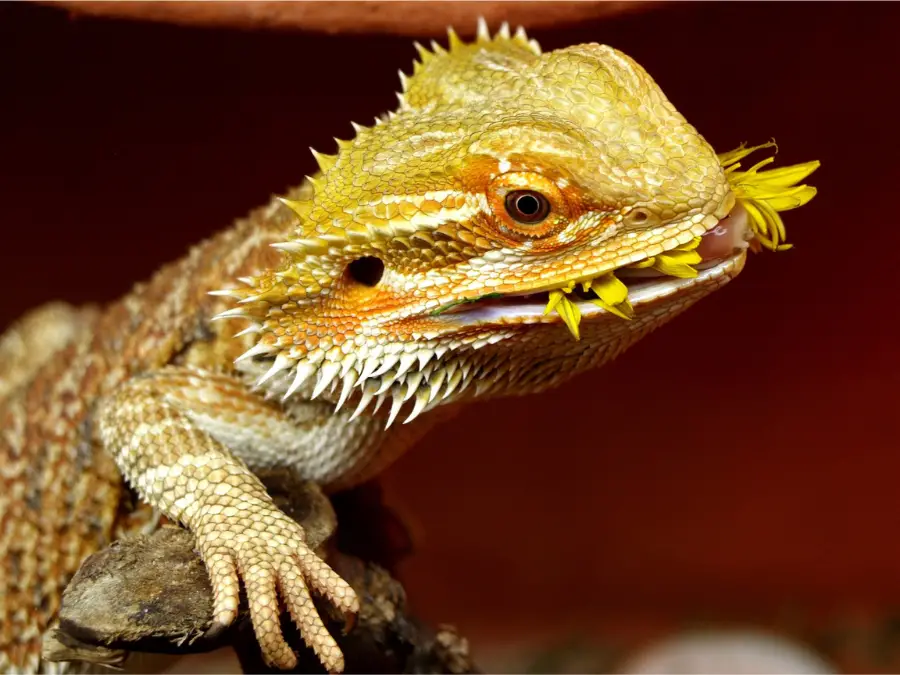
When it comes to feeding bearded dragons, their diet and the frequency at which you should feed them vary depending on their age. This section will discuss the feeding frequency and amounts specifically for baby, juvenile, and adult bearded dragons.
Baby Bearded Dragons
For baby bearded dragons, their diet should consist mainly of insects, as they require a high amount of protein for proper growth.
Some suitable insects include:
- Dubia roaches
- Crickets
- Mealworms
Baby bearded dragons should be fed 3 times a day, allowing them to eat as many insects as they can within a 10-minute time frame. It is important not to overfeed them, as this can lead to health issues. Baby bearded dragons can also be offered small amounts of fruits and vegetables.
Juvenile Bearded Dragons
As bearded dragons grow into juveniles, their diet should start to shift to include more fruits and vegetables. At this age, their diet should consist of 20% fruits, vegetables, and greens, and 80% insects. Some popular options for fruits and vegetables include:
- Strawberries
- Bell peppers
- Leafy greens, such as collard greens and kale
Juvenile bearded dragons should be fed 10-15 Dubia roaches twice daily. It may be helpful to offer fruits and vegetables separately from insects to help establish healthy eating habits.
Adult Bearded Dragons
When bearded dragons reach adulthood, their diet should consist mainly of fruits, vegetables, and greens, with insects making up a smaller portion. Adult bearded dragons should consume 80% fruits, vegetables, and greens, and 20% insects.
Some suggested fruits and vegetables for adult bearded dragons include:
- Squash
- Blueberries
- Mustard greens
Adult bearded dragons should be fed insects every other day, while fruits and vegetables should be offered daily. To prevent overfeeding, only leave the fruits, vegetables, and insects in the enclosure for 30 minutes before removing any uneaten portions.
It’s important to note that the specific amounts and frequency of feedings may vary based on an individual bearded dragon’s needs, so it’s crucial to consult with a reptile specialist or veterinarian for personalized advice.
Watch this Safe Food Guide For Bearded Dragons | Vegetables, Fruits, and Bugs video
Nutritional Benefits of Fruits
Fruits provide a wide range of nutritional benefits to bearded dragons, making them an ideal healthy treat for their diet. When offering fruits, it is important to choose the appropriate types and adhere to moderation, as too much fruit can lead to health problems.
One of the most important components of fruits for bearded dragons is their richness in vitamins. For instance, blueberries and raspberries are excellent sources of vitamin C and antioxidants, helping boost the immune system and overall health.
Additionally, fruits like apples, papayas, and mangos are great sources of vitamin A, which is essential for maintaining good eye health and supporting growth and development.
Aside from vitamins, fruits also offer essential minerals such as calcium, iron, phosphorus, and potassium. Cantaloupes and honeydews are high in potassium and vitamin A, making them valuable to a bearded dragon’s diet. Similarly, strawberries provide a delicious taste while offering significant antioxidants to help ward off diseases.
To make fruit consumption more engaging for bearded dragons, consider offering a variety of textures and colors.
Here is a sample list of fruits that are safe for bearded dragons:
- Apples
- Strawberries
- Blueberries
- Raspberries
- Cantaloupes
- Honeydews
- Papayas
- Mangos
Remember to remove any seeds or pits from the fruit before offering it to your bearded dragon, as they can pose a choking hazard or cause digestive issues. It is also essential to thoroughly wash the fruit to remove any pesticides or harmful residues.
In conclusion, while insects remain the primary source of protein for bearded dragons, supplementing their diet with fruits can provide essential vitamins, minerals, and other nutritional benefits that contribute to their overall health.
Just remember to exercise moderation and choose safe and beneficial fruits for your bearded dragon.
Potential Health Hazards
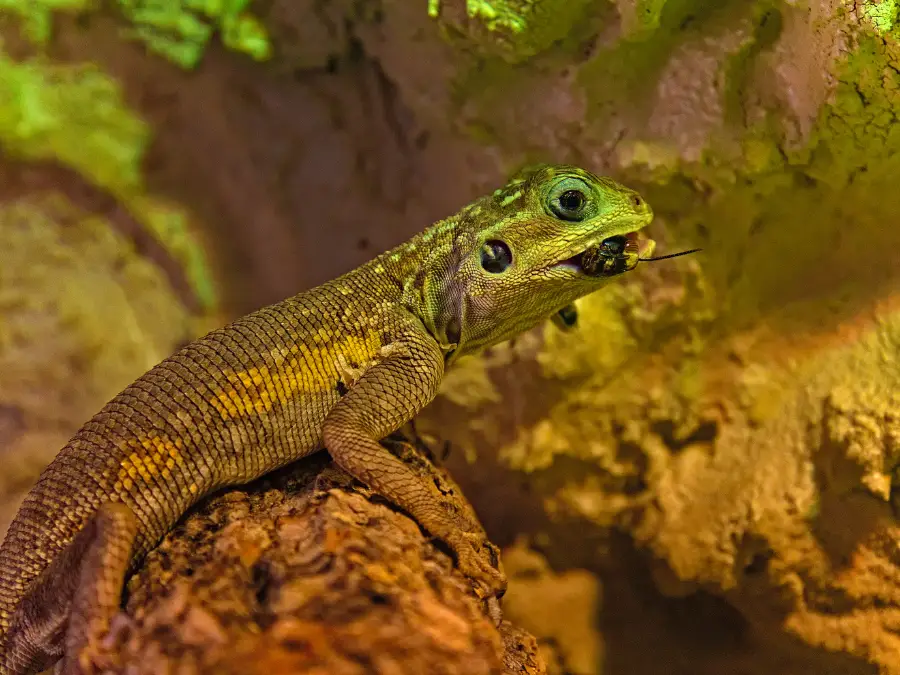
Feeding your bearded dragon the wrong types of fruits can lead to several health issues. Generally, it is best to avoid fruits high in oxalic acid, sugar, or acidity. Oxalic acid can bind with calcium and result in calcium deficiency, putting your bearded dragon at risk of metabolic bone disease.
The high sugar content can cause obesity and diarrhea, while a high acidity level can irritate the digestive system.
Some fruits high in oxalic acid include spinach, beet greens, and rhubarb. Instead, opt for fruits low in oxalates like apples, blueberries, and blackberries. When it comes to sugar, be cautious with fruits like grapes, which are known to be high in sugar content. Moderation is key when it comes to feeding your bearded dragon these types of fruits.
Overconsumption of fruits can also lead to impaction, a condition where the bearded dragon’s digestive tract becomes blocked. Signs of impaction include loss of appetite, lethargy, and constipation.
To reduce the risk of impaction, feed your bearded dragon fruits in moderation and ensure that they have access to proper temperatures and basking spots.
Citrus fruits, such as oranges and lemons, are known for their acidity and should be avoided as they can potentially cause digestive issues in bearded dragons. Instead, choose fruits that are lower in acidity and more suitable for your pet’s diet.
Keep in mind that while fruits can be a healthy addition to your bearded dragon’s diet, they should always be fed in moderation as part of a balanced diet, including insects and vegetables. By being mindful of potential health hazards, you can ensure that your bearded dragon stays healthy and happy.
Conclusion: What Fruits Can a Bearded Dragon Eat
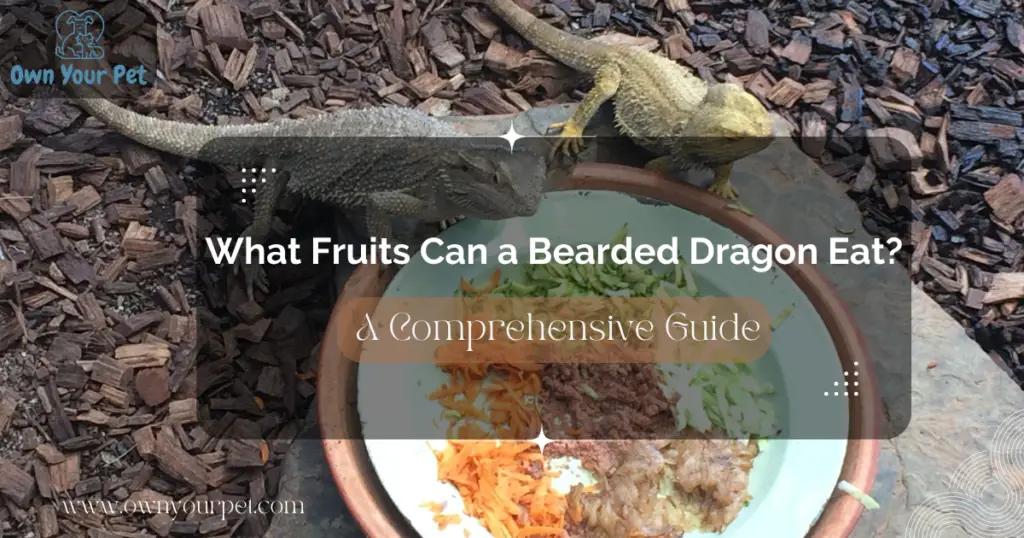
In conclusion, offering a variety of leafy greens such as mustard greens, collard greens, and turnip greens is crucial for the calcium absorption of both baby and adult bearded dragons. These greens serve as a staple food and provide essential nutrients. While fruits can be included in their diet as an occasional treat, it’s important to consider the calcium-to-phosphorus ratios and the oxalate and fat content.
Additionally, dusting their food with calcium powder ensures adequate calcium intake. Poor calcium can cause health issues.
Remember, each pet lizard is unique; some may be picky eaters. So it’s important to offer a range of fresh green vegetables like bearded dragon broccoli and monitor their diet closely, especially for baby beardies who require special attention to prevent poor calcium levels.
FAQs
Can bearded dragons consume dairy products?
No, dairy products are not suitable for pet lizard like bearded dragons as they cannot properly digest lactose.
How can I keep my bearded dragon hydrated?
Ensure your bearded dragon has access to fresh water daily and offer hydrating foods like leafy greens and juicy fruits.
What constitutes a proper diet for a bearded dragon?
A proper diet for a bearded dragon includes a variety of leafy vegetables, insects, and occasional fruits as treats.
Can bearded dragons eat human foods?
While some human foods can be given in moderation, it’s important to avoid foods that are high in salt, sugar, or processed ingredients.
Should I provide supplements for my bearded dragon’s diet?
Yes, bearded dragons may require occasional supplementation with calcium and vitamin D3 to maintain their overall health and well-being.
Please note that it’s important to consult with a reptile veterinarian or a knowledgeable herpetologist for specific dietary recommendations for your pet bearded dragon.
